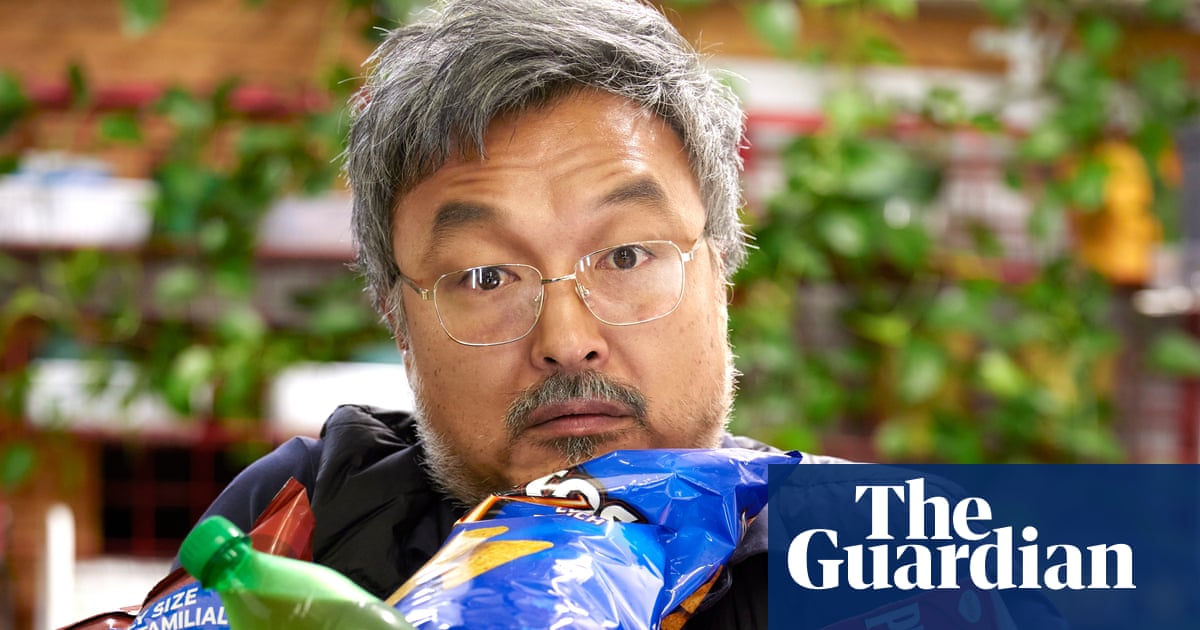Born in South Korea in 1974 and raised in Toronto, Canada, Ins Choi is a writer and actor. He’s best known for his play turned sitcom Kim’s Convenience, an offbeat comedy inspired by his immigrant family’s shop. It premiered at the Toronto fringe in 2011, with Choi playing the titular family patriarch’s son, before being turned, in 2016, into a CBC sitcom, which ran for five seasons. Now, 13 years on from the play’s debut, Choi graduates to the role of Kim in an eight-week revival of the play at London’s Riverside Studios, following a sold-out run at Park theatre.
Kim’s Convenience was popular right from its premiere at the Toronto fringe. Why do you think it struck a chord with people?
Tickets were only 10 or 15 bucks, so if it was bad people wouldn’t feel ripped off. So maybe that lowered expectations! Plus, at the time, there really wasn’t a lot out there with Asian characters. And it was also very funny – I think that humour alone attracted a sold-out audience and it just grew and grew from there.
What are the biggest differences between the play Kim’s Convenience and the TV series it spawned?
The TV show is very much a sitcom. The play is like this deeper well from which the TV show draws its scenes and humour. People who have only seen the TV show will be surprised by the dramatic thread running through the play – it’s a subtle retelling of the return of the prodigal son.
After originally playing the son character Jung, you’re now playing Appa, who’s inspired by your own father. What’s that like?
I was very scared about returning to acting on stage. But I’ve aged a lot and my hair is turning white – probably from the stress of having two kids of my own. So being in that role wasn’t that far of a stretch. And when my kids came to see me perform, they were laughing, saying: “That’s just like you at home.” It was a very full-circle moment.
How do you find the line between lovingly depicting the quirks of an immigrant character and creating a stereotype?
Growing up, I loved the John Hughes movie Sixteen Candles. But there was this one Asian character, Long Duk Dong, who’s kind of a stereotypical character, always in the background, the butt of the joke. So I do understand the dangers of fuelling negative stereotypes. But I think if a character is invested in, and it’s written truthfully, lovingly, it’s different. Appa is quirky, he’s weird, but I know many men like that, whom I love. I don’t think he’s a stereotype. What also makes the difference is that he’s the protagonist, he’s not just in the background. We need more characters like that.
How have audiences responded to the show?
When I was performing at the Park theatre, the exit for the cast was through the theatre’s lobby, and often there would be groups of mostly Asian audience members hanging back to tell us, often with tears, how much they connected with the show. I never know what to say or do, but that packs a big emotional punch.
It took a while for you to get your first break. Was it hard for you to choose the creative path of writing?
I feel like I didn’t have a choice. My family moved to Toronto with a pocket full of change in the 70s. My uncle set up a store called Kim’s Grocer, and we lived above it, the two families together. My family is full of great storytellers and entertainers who could have gone into the arts. But the first generation to come to a new country sacrifice themselves so the second generation have the luxury of choosing what they want to do. I daydreamed a lot, fiddled around with poetry and songs at a time when there weren’t many Asian writers in the mainstream in Canada. My mom once counselled me: “You’re a good writer, but maybe this culture isn’t ready for you.” But actually, the first generation survives so that the second generation can tell those stories.
Who were your biggest inspirations growing up?
The Asians I remember seeing on TV growing up were Bruce Lee and David Suzuki, so my choices were kung fu fighter or scientist. I couldn’t fight and I wasn’t that smart, so my future looked dim. But in all seriousness, my dad was my role model. He was a pastor of a Korean immigrant church in downtown Toronto. I loved how he told stories, making people laugh, and constantly asking the big questions. Why we were? Who we were? And how to live?
Korean culture has exploded into the mainstream over the past few years. Is that something you saw coming?
Not at all. I remember being 10 years old and wanting Adidas or Nike gear to blend in and be cool. It was like: “Aww man, why do I have to wear Korean shoes?” There was a bit of cultural shame. But now, white teenagers like the ones in Sixteen Candles are in love with Korean groups like BTS or Blackpink. It’s so surprising to see girls filming themselves doing K-pop dances as I walk around London.
What are you doing next?
I can’t really get into details, but I’ve had a few TV shows in development. And during the Hollywood writers’ strike, I returned to writing for theatre – it’s something I’m steeped in. I love it.
There’s more and more anti-immigrant rhetoric on the global stage. Does this affect the stories you want to tell in the future?
Not really. If anything, it fuels what I’m already writing. I think well-told stories with humour allow audiences into the shoes of others, and imbue empathy. Enough hearts changed can change societies.
